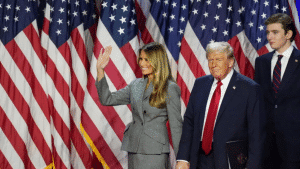PNN – In the last days of 2024, the world continues to witness major political events and developments in different dimensions; A year in which the process and scope of its developments were so fast and unbelievable that we can safely say that the face of some regions of the world has changed several times in 2024. But did these extensive political changes in the world take place with war and conflict or did they come from the hearts of the ballot boxes?
In the Middle East, everything that has been seen as a nightmare for more than 40 years has happened in front of our eyes in a short period of time. Direct conflict between Iran and Israel and in the last month of 2024, the fall of Assad and the coming to power of a group in one of the most important countries in the region, Syria.
In Africa, the situation was similar. Some big countries like Mali, Niger, Burkina Faso faced huge changes and were able to overcome the old French colonialism and expel the country’s soldiers from their lands.
Europe also faced many ups and downs this year. In this year, Europe moved towards far-right parties, which to some extent challenged the discourse of the European Union. On the other hand, the war in Ukraine still imposed its heavy consequences on this union, as its consequences were reflected in the popular votes in the elections of England, France and Germany.
In America, there was a big turn in the political arena and the people of this country made an election against the wishes of European politicians and returned Donald Trump to the White House for the second time.
One of the important and prominent political points in 2024 that should be mentioned was the presence of more than 3 billion people of the world at the polls in 74 elections that were held at various levels in different countries.
The process of changes in this year is such that even in its last days and hours, the expectation of changes and the continuation of changes are still not far from expected.
Read more:
Trump’s destructive goals in opening up the country and interfering in the affairs of countries
The record for the most elections in one year
The year 2024 holds the record for the highest number of votes received in election boxes in one year. 6 major countries in the world including: Iran, Russia, India, Indonesia, the United States and Pakistan, and the 27 EU member states that elected the new European Parliament, all went to the polls. A thumb count shows that this year, elections were held in more than 70 countries in the world, where half of the world’s population lives. The results of some of these elections have influenced regional and international political trends, and others have only implemented a show of democracy.
Looking at the outcome of the elections, we realize that the results obtained for the established governments were remarkably weak. The failure of “Kamala Harris” in the United States and the conservatives in the United Kingdom has been one of the most important failures of the established governments. But there were also cases such as Narendra Modi in India, Shigeru Ishiba in Japan, and Cyril Ramaphosa in South Africa and Emmanuel Macron in France who remained in power despite poor election results.
Some governments that have been slightly close to democratic indicators, such as Algeria, Azerbaijan, or Rwanda, saw an improvement in the vote rate of their political representatives in a managed election, although there were exceptions. Sheikh Hasina, the prime minister of Bangladesh, won the country’s elections in January in a flawed process, but with a smaller margin than before, but was ousted a few months later in a wave of popular protests.
In Iran, when the Iran’s late president Seyed Ebrahim Raisi was martyred in a helicopter crash, in a complete turnaround, the country elected the reformist candidate Masoud Pezishkiyan in his place.
Some analysts consider the economic components and the global consequences of immigration to be the most important indicators affecting the results of elections around the world, in order to explain the poor results obtained for governments around the world.
Bangladesh
Prime Minister “Sheikh Hasina” was able to win the presidency of this country for the fifth term in the elections that were overshadowed by the brutal suppression of the opposition and the participation of 40% of the voters. In the months leading up to the election, tens of thousands of opposition leaders and senior party members were arrested en masse, and at least nine died in prison in the three months before the election. In August, Hasina was forced to resign and flee the country after massive student-led protests began over the quota system for government jobs.

Taiwan
In Taiwan, the people of this island elected “Lai Ching-te” as their next president, thus, for the third consecutive term, the Democratic Progressive Party was still able to gain power in this island. The result of this election brought Beijing’s anger in such a way that only two days after the election, China was able to reduce the number of Taiwan’s official allies to only 12 countries with its diplomatic measures, and also with the entry of warplanes into Taiwan’s airspace, its military threats.
Republic of Azerbaijan
“Ilham Aliyev” won more than 90% of the votes in this country’s elections and remained in this post for the fifth consecutive term. Many international observers pointed out in their reports that the elections held were neither free nor fair. After recapturing the Nagorno-Karabakh region from Armenia last year, Aliyev held the country’s elections, which were planned for 2025, in early 2024 with changes.
Russia
“Vladimir Putin” won the presidential election of this country decisively for the fifth time. The election was held in the middle of the country’s war with Ukraine and was widely condemned by Western countries. In this election, Putin was able to get 87.28% of the votes and with 74% participation, he set a historical record of the number of people attending the polls.
Only a month before the elections, Alexei Navalny, Russia’s most prominent opposition leader, died under mysterious circumstances in a Siberian prison. This election was also seen as an attempt to gain popular support for the continuation of the Kremlin’s plans in the Ukraine war.

Ukraine
The presidential elections of Ukraine were supposed to be held in the spring of 2024. This was while Volodymyr Zelensky’s five-year term had ended. However, the parliament and the presidency of this country suspended the elections and postponed them for an unknown time using the martial law. Observers say that the vote, as a safety valve to get rid of internal tensions and popular discontent in Ukraine’s current situation, could be constructive even if Putin wants to bombard it during the vote.

South Africa
The African National Congress party lost its majority outright for the first time in 30 years as voters rejected Nelson Mandela’s party after years of corruption, leadership scandals, frequent power cuts and high crime rates. Unemployment was punished. However, the National Congress party still emerged as the largest party in the parliament with 40% of the votes and has now started negotiations to form a coalition government.
India
The ruling Bharatiya Janata Party, led by Narendra Modi, lost its parliamentary majority, dealing an unexpected blow to Prime Minister Modi. Voters opposed Modi’s nationalist and Hindu policies in parts of the country. Nevertheless, the ruling party along with its political ally, the National Democratic Union Party, managed to win 292 seats in a coalition, which was enough to form a government in the next five years and bring Modi back to power for a third term.

England
Keir Starmer, the leader of the Labor Party, came to power with a decisive victory that ended 14 years of Conservative rule over the British political sphere, the latter half of which was dominated by the economic and political consequences of Brexit and a rotation of Conservative prime ministers. However, Stormer’s victory was due more to the Tories’ extreme unpopularity than voters’ enthusiasm for Stormer and Labour. Stormer is now facing growing domestic problems in England, with Britain facing crises in various areas including immigration, the environment, prisons, health services and housing.
European Union
Right-wing populist parties made stunning gains in the European Parliament elections across the 27 countries of the union.
In France, Emmanuel Macron held early parliamentary elections after the heavy defeat of his allies from the far-right National Rally of Marine Le Pen. Meanwhile, in Germany, Chancellor Olaf Schultz’s coalition had a bad night, as the far-right Alternative for Germany party made significant gains. The extreme right also managed to win a large share of the vote in Italy, Austria, Hungary and the Netherlands.
Mexico
“Claudia Sheinbaum” became the first female and Jewish president of Mexico with a decisive victory. The leftist scientist and former mayor of Mexico City was able to win Mexico’s bloody elections by promising massive social changes. This round of Makrik elections was the most violent election in the modern history of this country, which was immortalized in the history of this country with the death of more than 30 candidates and the withdrawal of hundreds of others due to the competition of criminal groups.
One of Shinbaum’s biggest tasks is trying to stop the rise in gang-related violence in recent years. The new president will also face tense negotiations with the White House over the country’s huge Mexican immigrant population, as well as the growing flood of illegal immigrants crossing into the United States from Mexico.

France
Contrary to the results of the EU elections, the left coalition won the most seats in the parliament in a surprising result that prevented the far-right Marine Le Pen from taking power.
These results in the French elections mean that no party could win an absolute majority.
Burkina Faso
In Burkina Faso, elections were planned for 2024, but these elections were postponed for another five years by the military government that has been in power since two years ago. Many reasons have been mentioned for this issue, including the conflicts of the military government at the time, which has a lot of popular support, with radical Islamist groups on the one hand, and on the other hand, fighting with foreign powers, including some of its neighbors.

Georgia
Georgian Dream, led by Prime Minister Irakli Kobakhidze, managed to retain power for another four years in a landmark election that was immediately contested by the opposition. Georgia’s pro-Western president, Salome Zurabishvili, announced that she would not recognize the election results, insisting that the country was a victim of “Russian special operations.”
In terms of European institutions on paper, the ruling party wants to move closer to the West and is pursuing EU and NATO membership with the support of its largely pro-Western population. However, in reality, Georgians fear that Russia will once again dominate the country’s political structures with the cooperation of the country’s government.
America

“Donald Trump” was elected as the 47th president of the United States in a stunning political resurrection in the United States, which caused a wave of shock in the United States and around the world. The Republican, who defeated Democratic nominee Kamala Harris, is the first felon to win the White House and the oldest person ever to be elected president.

